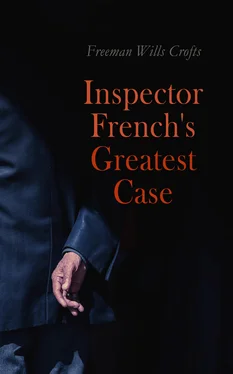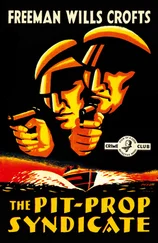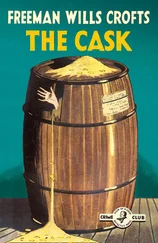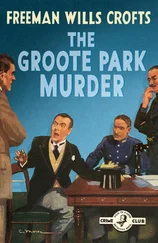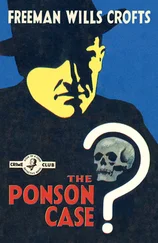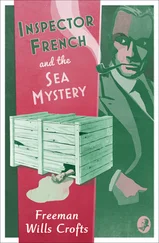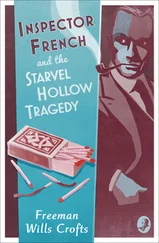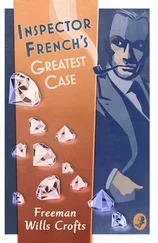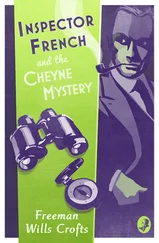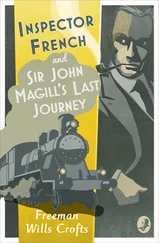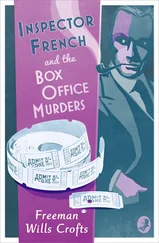An idea struck him, and he examined the letter more closely.
“Are you sure this is really Mr. Duke’s signature?” he asked slowly.
Mr. Schoofs looked at him curiously.
“Why, yes,” he answered. “At least, it never occurred to me to doubt it.”
“You might let me see some of his other letters.”
In a few seconds half a dozen were produced, and French began whistling below his breath as he sat comparing the signatures, using a lens which he took from his pocket. After he had examined each systematically, he laid them down on the table and sat back in his chair.
“That was stupid of me,” he announced. “I should have learnt all I wanted without asking for these other letters. That signature is forged. See here, look at it for yourself.”
He passed the lens to Schoofs, who in his turn examined the name.
“You see, the lines of that writing are not smooth; they are a mass of tiny shakes and quivers. That means that they have not been written quickly and boldly; they have been slowly drawn or traced over pencil. Compare one of these other notes and you will see that while at a distance the signatures look identical, in reality they are quite different. No, Mr. Duke never wrote that. I am afraid Mr. Vanderkemp has been the victim of some trick.”
Schoofs was visibly excited. He hung on the other’s words and nodded emphatically at his conclusions. Then he swore comprehensively in Dutch. “Good heavens, Inspector!” he cried. “You see the significance of all that?”
French glanced at him keenly.
“In what way?” he demanded.
“Why, here we have a murder and a robbery, and then we have this, occurring at the very same time. . . . Well, does it not look suggestive?”
“You mean the two things are connected?”
“Well, what do you think?” Mr. Schoofs replied with some impatience.
“It certainly does look like it,” French admitted slowly. Already his active brain was building up a theory, but he wanted to get the other’s views. “You are suggesting, I take it, that Vanderkemp may have been concerned in the crime?”
Schoofs shook his head decidedly.
“I am suggesting nothing of the kind,” he retorted. “That’s not my job. The thing merely struck me as peculiar.”
“No, no,” French answered smoothly, “I have not expressed myself clearly. Neither of us is making any accusation. We are simply consulting together in a private, and, I hope, a friendly way, each anxious only to find out the truth. Any suggestion may be helpful. If I make the suggestion that Mr. Vanderkemp is the guilty man in order to enable us to discuss the possibility, it does not follow that either of us believes it to be true, still less that I should act on it.”
“I am aware of that, but I don’t make any such suggestion.”
“Then I do,” French declared, “simply as a basis for discussion. Let us suppose then, purely for argument’s sake, that Mr. Vanderkemp decides to make some of the firm’s wealth his own. He is present when the stones are being put into the safe, and in some way when Mr. Duke’s back is turned, he takes an impression of the key. He crosses to London, either finds Gething in the office or is interrupted by him, murders the old man, takes the diamonds, and clears out. What do you think of that?”
“What about the letter?”
“Well, that surely fits in? Mr. Vanderkemp must leave this office in some way which won’t arouse your suspicion or cause you to ask questions of the London office. What better way than by forging the letter?”
Mr. Schoofs swore for the second time. “If he has done that,” he cried hotly, “let him hang! I’ll do everything I can, Inspector, to help you to find out, and that not only on general grounds, but for old Gething’s sake, for whom I had a sincere regard.”
“I thought you would feel that way, sir. Now to return to details. I suppose you haven’t the envelope that letter came in?”
“Never saw it,” Mr. Schoofs replied. “The clerk who opened it would destroy it.”
“Better have the clerk in, and we’ll ask the question.”
Mr. Schoofs made a sudden gesture.
“By Jove!” he cried. “It was Vanderkemp himself. He acts as head clerk when he is here.”
“Then we don’t get any evidence there. Either the letter came through the post, in which case he destroyed the envelope in the usual way, or else he brought the letter to the office and slipped it in among the others.”
French picked up the letter again. Experience had taught him that typescript could be extremely characteristic, and he wondered if this in question could be made to yield up any of its secrets.
It certainly had peculiarities. The lens revealed a dent in the curve of the n, where the type had evidently struck something hard, and the tail of the g was slightly defective.
French next examined the genuine letters, and was interested to find their type showed the same irregularities. It was therefore certain that the forged letter had been typed in the London office.
He sat thinking deeply, unconsciously whistling his little tune through his closed teeth. There was another peculiarity about the forged note. The letters were a trifle indented, showing that the typewriter keys had been struck with rather more than the usual force. He turned the sheet over, and he saw that so much was this the case that the stops were punched almost through. Picking up the genuine letters, he looked for the same peculiarity, but the touch in these cases was much lighter and even the full stop barely showed through. This seemed to justify a further deduction—that the writer of the forged note was unskilled, probably an amateur, while that of the others was an expert. French felt he could safely assume that the forged note had been typed by some unauthorised person, using the machine in the London office.
But, so far as he could see, these deductions threw no light on the guilt or innocence of Vanderkemp. The letter might have come from some other person in London, or Vanderkemp might have typed it himself during one of his visits to the metropolis. More data was wanted before a conclusion could be reached.
Though from what he had seen of Schoofs, the Inspector thought it unlikely that he was mixed up in what he was beginning to believe was a far-reaching conspiracy, he did not mention his discoveries to him, but continued trying to pump him for further information about the missing traveller. Vanderkemp, it seemed, was a tall man, or would have been if he held himself erect, but he had stooped shoulders and a slouching way of walking which detracted from his height. He was inclining to stoutness, and had dark hair and a sallow complexion. His chin was cleanshaven, but he wore a heavy dark moustache. Glasses covered his short-sighted eyes.
French obtained some samples of his handwriting, but no photograph of him was available. In fact, Mr. Schoofs did not seem able to supply any further information, nor did an interrogation of the typist and office boy, both of whom spoke a little English, produce any better results.
“Where did Mr. Vanderkemp live?” French asked, when he thought he had exhausted the resources of the office.
Читать дальше
